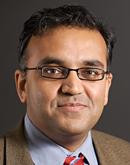The HCFO program ended in December 2016.
This site will no longer be updated, and some elements may not appear correctly.
Ashish Jha, M.D., M.P.H.

Ashish Jha, M.D., M.P.H., is an associate professor of health policy and management at the Harvard School of Public Health, associate professor of medicine at Harvard Medical School, and a staff physician at Boston VA Healthcare System and Brigham and Women’s Hospital. His research interests including quality of care, disparities in care, and the impact of information technology in those areas. In addition to his HCFO funded work, Dr. Jha’s work has recently examined IT adoption nationally, both among physicians and hospitals. He is broadly interested in how policy efforts to improve quality and efficiency of care, such as public reporting, pay for performance, and health IT, impact care overall as well as for vulnerable populations. Dr. Jha’s research has been published in the New England Journal of Medicine, Health Affairs, the Journal of the American Medical Association, the Annals of Internal Medicine, and Circulation.
Dr. Jha received his M.D. from Harvard University Medical School. He was trained in internal medicine at the University of California, San Francisco. During his tenure, he served as chief resident. Dr. Jha also completed General Medicine fellowship training at Brigham and Women’s Hospital, and received his M.P.H. in Clinical Effectiveness from Harvard School of Public Health. Dr. Jha received his bachelor’s degree from Columbia College.
From February 2008 through January 2009, Dr. Jha served as the principal investigator for a HCFO sponsored grant that examined the impact of pay-for-performance (P4P) incentives to improve quality in hospitals that care for minority or other underserved populations. The objective of the project was to provide more information about the impact of P4P on hospitals that serve disadvantaged populations, and help policymakers to design incentive systems that encourage higher quality care without disproportionately harming hospitals that care for these populations. The study found that among hospitals enrolled in the Premier Hospital Quality Improvement Demonstration, those that disproportionately served poor patients improved rapidly under P4P and fully caught up to other hospitals within three years of the program. Among control hospitals not receiving financial incentives for quality, providers that disproportionately cared for the poor continued to lag behind. These findings suggest that contrary to commonly held concerns, P4P may actually be an effective way to reduce disparities in care.
To read more about Dr. Jha’s study and findings, see HCFO December 2010 Findings Brief “What is the Effect of Pay for Performance on Hospitals that Serve Poor Patients?”
